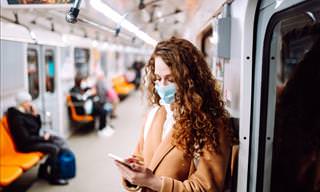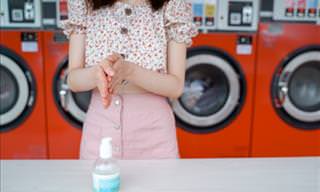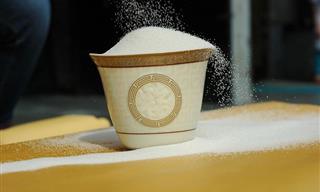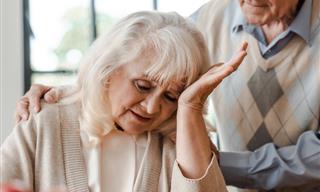The world is now more than a year into the Covid-19 pandemic, and thanks to the availability of the vaccines, many countries are slowly starting to lift restrictions and get back to normal. Spending an entire year in and out of lockdown, maintaining physical distance from others, and sitting in quarantine isn’t the norm for anyone. While these measures were essential to reduce transmission and save lives, it raises the question 'did this mass lifestyle shift affect the immune systems of adults, children, and infants born during the pandemic?'
This is what is currently known about the effects the pandemic has on our immune systems, and what to expect as we dive back into our old routines, according to health experts.
Was my immune system weakened by isolation?
You probably heard about the hygiene hypothesis, even if you don’t know it by name. It is the belief that exposure to certain bacteria and viruses in childhood helps the immune system develop. Based on that theory, some people are concerned that their immune systems could have “forgotten” how to fight off these disease-causing agents after not being exposed to them for over a year.

The good news is, this is not how immunity works. According to MIT Medical, by the time a person reaches adulthood, they have come into contact with many types of viruses and bacteria. The immune system creates a memory for these pathogens to produce antibodies and fight them off the next time they invade the body. In other words, your body has spent a lifetime learning how to tackle common illnesses either through direct exposure or through vaccination. One year of relative isolation and masking is not going to make much difference.
That being said, don’t be too surprised if you come down with a cold once you start socializing again. After all, you are going to be around more germs again and your immune system may be a bit out of practice. Moreover, many people’s immune systems may have been hampered by other lifestyle changes over the past year. For example, many people have been drinking alcohol more often, sleeping less, and coping with chronic stress.
What about younger children and infants?

You may ask yourself what this means for the younger children whose immune systems are still in the learning stages. There are studies that clearly demonstrate the link between toddlers’ proneness to develop viral illnesses and reduced exposure to microbes resulting from hygiene measures, such as frequent hand washing.
So should parents be concerned about sending their toddlers or infants back to daycare and preschool? Yes and no. One study from 2003 suggests that the most important exposures to microbes in early life are not related to colds, measles, or other childhood ailments, but to those microbes that were already around during the hunter-gatherer period when the immune system was evolving. They are often referred to as "old friends." Examples of such old friends are the mycobacteria present in the soil, water, and food, such as listeria and salmonella. They usually have a transient effect on the body because kids are consistently exposed to them and build up immunity.
Doctors also point to the fact that children who are breastfed or fed on donated breast milk receive some immune system programming from their mothers.
So even if your child or grandchild catches a cold after going back to their old routine, it is probably not a reason for major concern. On the contrary, it is an "opportunity for their immune systems to become exposed to and make antibodies to common childhood cold viruses,” said allergy and immunology specialist Sindhura Bandi.
Related: These Common Meds Weaken the Response to COVID-19 Vaccines
Does recovering from Covid-19 cause long-term immune system changes?
While most adults’ immune systems haven’t been changed directly by the pandemic, those who were infected by the novel coronavirus and recovered could experience long-term functional changes in their immune systems.
For some patients, recovery from the illness has led to long-term effects, commonly referred to as ‘long-haul COVID.’ This phenomenon may be tied up to the immune system. Experts are still learning about the exact cause of long-haul COVID.
One working theory is that lingering symptoms stem from a persistent inflammatory or autoimmune response. Experts are hard at work to unravel what all that means in terms of people’s immune systems as the world is opening back up. It is estimated that one in four Covid-19 patients is a long-hauler. Further research is needed to fully understand the broader impact of Sars-Cov-2 on the immune system.
In conclusion
Ultimately, there is no clear scientific evidence that engaging or avoiding certain habits can directly boost or weaken your immune system. However, taking care of your overall well-being is certainly a step in the right direction. Make sure to get six to eight hours of sleep nightly, get regular physical activity, and maintain a nutrient-rich diet.
And let's not forget that social distancing had a mental toll as well. Research has linked loneliness to all kinds of poor physical outcomes, including decreased levels of certain antiviral compounds in the body. “As people are able to connect again with family, friends, and colleagues, this can have an indirect effect on boosting the immune system,” Bandi said.
Lastly, most of us have become much more attuned and mindful of our own behavior, which may impact the health of others. This positive habit is sure to help us go back to normal in the smoothest possible manner.
Share this information with friends and family
 Go to BabaMail
Go to BabaMail



























